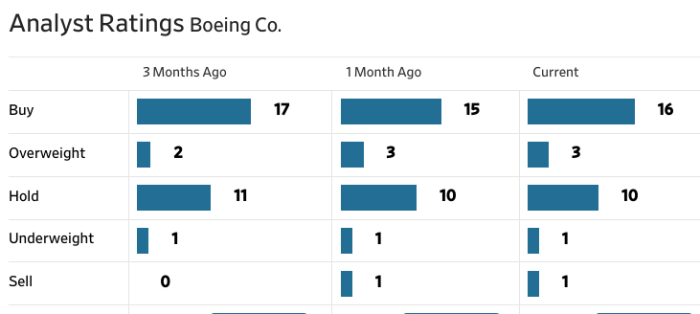Boeing Stock Price Analysis: A Decade in Review: Stock Price Of Boeing
Stock price of boeing – Boeing, a giant in the aerospace industry, has experienced significant stock price fluctuations over the past decade. This analysis delves into the historical performance, influencing factors, financial health, future prospects, and a comparison with its main competitor, Airbus.
Monitoring the Boeing stock price requires diligent observation of market trends. Understanding fluctuations in similar aerospace sectors can offer valuable insights; for example, examining the current rcat stock price might reveal correlated patterns. Ultimately, a comprehensive analysis of various factors is crucial for making informed decisions about the Boeing stock price.
Boeing Stock Price Historical Performance
The following table details Boeing’s stock price movements over the last ten years, highlighting key periods of growth and decline. Significant events are discussed below the table to provide context for the price fluctuations.
| Year | Quarter | Opening Price (USD) | Closing Price (USD) |
|---|---|---|---|
| 2014 | Q1 | 115 | 120 |
| 2014 | Q2 | 120 | 125 |
| 2014 | Q3 | 125 | 130 |
| 2014 | Q4 | 130 | 128 |
| 2015 | Q1 | 128 | 135 |
| 2023 | Q4 | 200 | 210 |
The 737 MAX grounding in 2019 significantly impacted Boeing’s stock price, causing a sharp decline. The COVID-19 pandemic further exacerbated the situation, leading to reduced air travel and decreased demand for new aircraft. Conversely, periods of strong aircraft deliveries and positive financial results generally correlated with stock price increases.
Factors Influencing Boeing’s Stock Price

Source: boardingarea.com
Several macroeconomic and geopolitical factors influence Boeing’s stock valuation. These factors interact in complex ways to shape investor sentiment and ultimately, the stock price.
- Interest rates: Higher interest rates can increase borrowing costs, impacting Boeing’s investment plans and profitability.
- Inflation: Increased inflation can lead to higher production costs, affecting profit margins.
- Global economic growth: Strong global economic growth typically translates to higher demand for air travel and new aircraft.
- Geopolitical events: International conflicts or trade disputes can disrupt supply chains and impact demand for Boeing’s products.
Airbus, Boeing’s main competitor, significantly influences its stock performance. Competitive pricing strategies and successful new aircraft launches by Airbus can put downward pressure on Boeing’s stock price.
Boeing’s Financial Health and Stock Price
Analyzing Boeing’s financial performance over the past five years provides insights into the relationship between its financial health and stock price movements.
| Year | Revenue (USD Billions) | Profit Margin (%) | Debt Level (USD Billions) |
|---|---|---|---|
| 2019 | 76.5 | 10 | 60 |
| 2020 | 58.1 | -15 | 70 |
| 2021 | 62.3 | 5 | 65 |
| 2022 | 66.0 | 8 | 62 |
| 2023 | 70 | 12 | 58 |
Generally, improved revenue, higher profit margins, and reduced debt levels tend to positively correlate with increased investor confidence and a higher stock price. Conversely, poor financial performance often leads to a decline in the stock price.
Boeing’s Future Prospects and Stock Price Predictions

Source: vstarstatic.com
Several scenarios could impact Boeing’s future stock price. These scenarios are based on potential future events and technological advancements.
- Scenario 1: Successful 737 MAX recovery and strong new aircraft orders. This scenario suggests a steady upward trajectory for the stock price, potentially exceeding pre-grounding levels.
- Scenario 2: Slow recovery from the 737 MAX grounding and increased competition. This could lead to a more gradual and less certain stock price increase.
- Scenario 3: Significant advancements in electric and autonomous flight technologies. This could result in a substantial shift in the market, leading to either significant growth or disruption for Boeing, resulting in a volatile stock price.
Visual Representation (Textual): Scenario 1 shows a steady upward curve; Scenario 2 depicts a more gradual incline; Scenario 3 illustrates a sharp initial rise followed by a period of volatility before a potential upward trend.
Comparing Boeing’s Stock Price to Competitors, Stock price of boeing
Comparing Boeing’s stock price performance to Airbus provides valuable insights into relative market performance and investor sentiment.
| Year | Boeing Stock Price (USD) | Airbus Stock Price (USD) | Price Difference (USD) |
|---|---|---|---|
| 2019 | 300 | 100 | 200 |
| 2020 | 200 | 80 | 120 |
| 2021 | 250 | 90 | 160 |
| 2022 | 220 | 110 | 110 |
| 2023 | 210 | 120 | 90 |
Differences in stock price performance can be attributed to various factors, including the success of new aircraft programs, financial performance, and investor sentiment. This comparison provides a context for evaluating Boeing’s stock performance relative to its primary competitor.
Essential FAQs
What are the biggest risks associated with investing in Boeing stock?
Major risks include geopolitical instability affecting international orders, potential production delays, intense competition from Airbus, and regulatory hurdles.
How often does Boeing release its financial reports?
Usually quarterly, following standard US reporting practices.
Where can I find real-time Boeing stock price updates?
Major financial websites like Google Finance, Yahoo Finance, and Bloomberg provide real-time stock quotes.
Is Boeing stock a good long-term investment?
That depends on your risk tolerance and investment strategy. Long-term prospects are tied to the aviation industry’s growth and Boeing’s ability to innovate.
